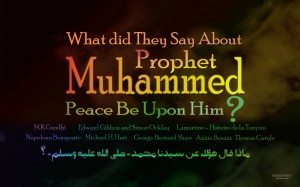
It is impossible for anyone who studies the life and character of the great Prophet of Arabia to feel anything but reverence for the mighty Prophet. Annie Besant
Dr. Abudrrahman Al-Sheha quoted in his book some impartial statements about the Prophet Muhammad (peace be upon him). They are as follows:
1. The German Poet, Wolfgang Göthe1 said, “I looked into history for a human paradigm and found it to be in Muhammad.
2. Professor Keith Moore2 in his book “The Developing Human”, “It is clear to me that these statements must have come to Muhammad from God, or Allah, because most of this knowledge was not discovered until many centuries later. This proves to me that Muhammad must have been a messenger of God, or Allah.”
He further said, “I have no difficulty in my mind reconciling that this is a divine inspiration or revelation, which lead him to these statements.”
3. Dr. Maurice Bucaille3 said in his book “The Qur’an, the Bible and Modern Science”, “A totally objective examination of it [the Qur’an] in the light of modern knowledge, leads us to recognize the agreement between the two, as has been already noted on repeated occasions. It makes us deem it quite unthinkable for a man of Muhammad’s time to have been the author of such statements, on account of the state of knowledge in his day. Such considerations are part of what gives the Qur’anic Revelation its unique place, and forces the impartial scientist to admit his inability to provide an explanation which calls solely upon materialistic reasoning.”
4. Annie Besant,4 said in the book “The Life and Teachings of Mohammad”, “It is impossible for anyone who studies the life and character of the great Prophet of Arabia, who knew how he taught and how he lived, to feel anything but reverence for the mighty Prophet, one of the great messengers of the Supreme. And although in what I put to you I shall say many things which may be familiar to many, yet I myself feel, whenever I reread them, a new way of admiration, a new sense of reverence for that mighty Arabian teacher.“
5. Dr. Gustav Weil in History of the Islamic Peoples said, “Muhammad was a shining example to his people. His character was pure and stainless. His house, his dress, his food–they were characterized by a rare simplicity. So unpretentious was he that he would receive from his companions no special mark of reverence, nor would he accept any service from his slave which he could do for himself. He was accessible to all at all times. He visited the sick and was full of sympathy for all. Unlimited was his benevolence and generosity as also was his anxious care for the welfare of the community.”([5])
6. Maurice Gaudefroy said: “Muhammad was a prophet, not a theologian, a fact so evident that one is loath to state it. The men who surrounded him and constituted the influential elite of the primate Muslim community, contented themselves with obeying the law that he had proclaimed in the name of Allah and with following his teaching and example.” ([6])
7. Washington Irving([7]), said: “His military triumphs awakened no pride nor vain glory as they would have done had they been effected by selfish purposes. In the time of his greatest power he maintained the same simplicity of manner and appearance as in the days of his adversity. So far from affecting regal state, he was displeased if, on entering a room, any unusual testimonial of respect was shown to him.” ([8])
Footnotes:
[1] German writer and scientist, a master of poetry, drama, and the novel. He also conducted scientific research in various fields, notably botany, and held several governmental positions.
[2] He was the former President of the Canadian Association of Anatomists, Department of anatomy and cell biology, University of Toronto.
[3] Dr. Maurice Bucaille was an eminent French surgeon, scientist, scholar and author of ‘‘The Bible, The Qur’an and Science.’
[4] English theosophist, philosopher, and political figure who advocated home rule and educational reforms in India.
[5] Encyclopedia of Seerah, by Afzalur‐Rahman.
[6] Ibid.
[7] He was a famous writer. He died in 1859.
[8] Encyclopedia of Seerah, by Afzalur‐Rahman.
_______________________
Source: Taken from the book entitled “Muhammad, the Messenger of Allah” by Abdurrahman Al-Sheha
 Arabic
Arabic English
English Spanish
Spanish Russian
Russian korean
korean

